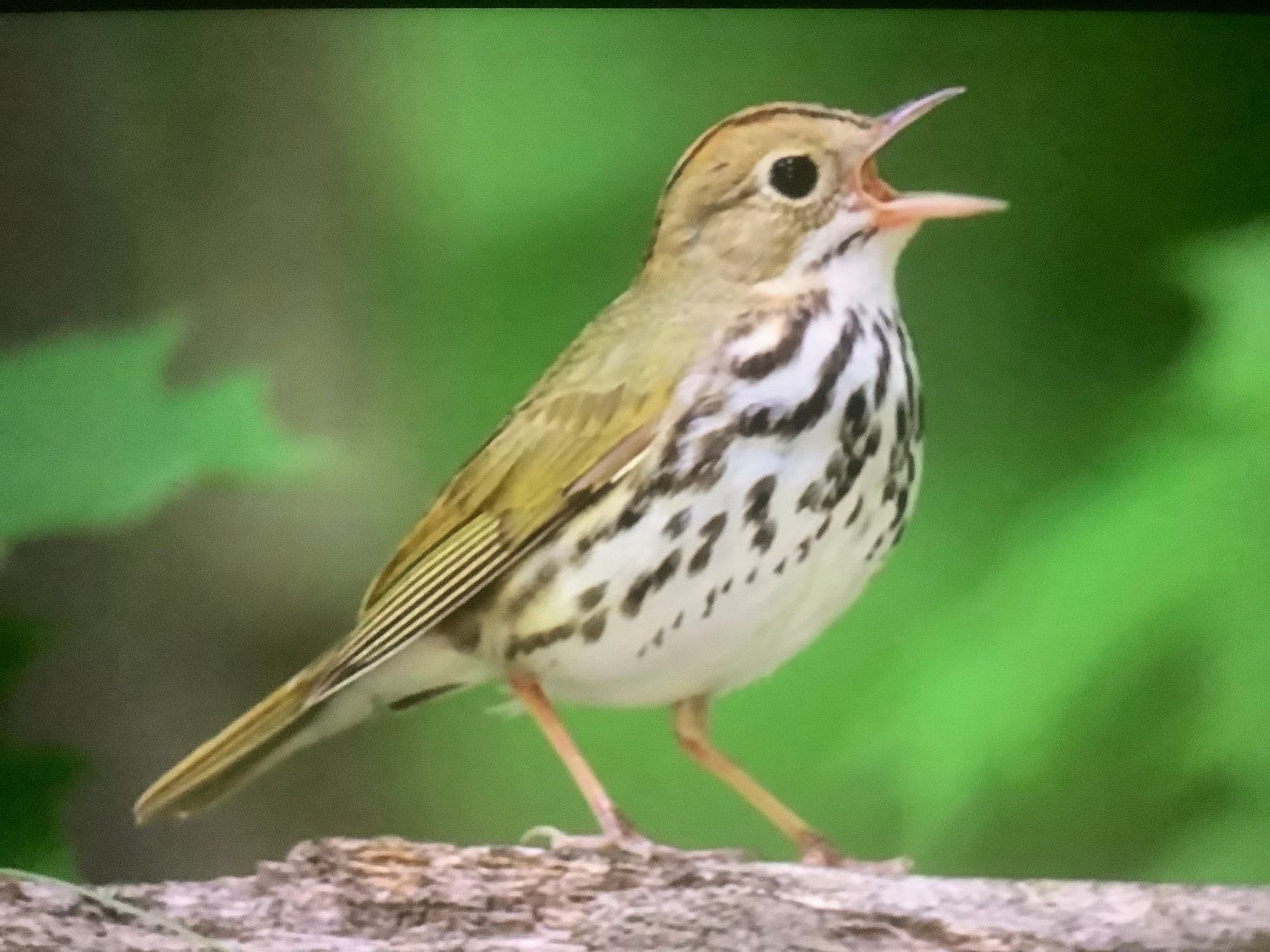There is a singer everyone has heard,
Loud, a mid-summer and a mid-wood bird,
Who makes the solid tree trunks sound again.
He says that leaves are old and that for flowers
Mid-summer is to spring as one to ten.
He says the early petal-fall is past
When pear and cherry bloom went down in showers
On sunny days a moment overcast;
And comes that other fall we name the fall.
He says the highway dust is over all.
The bird would cease and be as other birds
But that he knows in singing not to sing.
The question he frames in all but words
Is what to make of a diminished thing.
— Robert Frost, “The Oven Bird”At the age of 80 I find myself the surveyor of a diminished world.
I speak not just of my shorter, slower reach within my shrunken personal sphere, but of the greater world beyond, now broken into small pieces, as the Romans meant when they used the verb diminuere.
Broken in the sense meant by Edgar Allan Poe in a line drawn from Ecclesiastes — “Ah broken is the golden bowl! the spirit flown forever!”
In his poem “Lenore,” as elsewhere, Poe was fixated on what he regarded as the penultimate tragic subject, the death of a beautiful woman. But the particular genius of Poe was to make such an image suggestive of so much more. Perhaps more than he knew.
Poe’s City of Baltimore, for example, like so many of our urban centers, is now lying in its open coffin. Look your last on one of America’s earliest flourishing and beautiful port cities.
And look your last on the Church that gained its first toehold on American soil in Baltimore, where America’s Catholic bishops still convene in order to preside over the subduction of The Faith beneath the postmodernist zeitgeist. Broken is the golden vessel that once contained, nurtured, and defined so many of us.
About such things I might sound like the narrator in another of Poe’s poems, asking whether, if ever again, he shall clasp the radiant and sainted Lenore —
“Quoth the Raven,” the bird now associated with Baltimore’s professional football team, “Nevermore.”
Or so I am tempted to say. But despair is not in my nature, nor in my training. I identify far more fully with Robert Frost’s ovenbird than with Poe’s raven in surveying the dusty fall of the world in which up to now I have found myself.
With the focus being on the bird’s internal disposition, or mood, Frost’s sonnet directs us inward, leading us toward the question of what it means “in singing not to sing.”
By some strange association, I’m put in mind of the 1991 single by REM entitled “Losing My Religion” and these particular lines:
That’s me in the corner That’s me in the spot-light . . . . . Oh no I’ve said too much I haven’t said enough .
What does it mean simultaneously to sing and not sing, to say too much and not say enough? And to whom or for whom are we singing or speaking, or calling, in the first place?
And why the declination to “be as other birds,” whose singing, presumably, lasts only as long as the mating and breeding season? Are we supposed to carry on as we always have, now that life and love and purpose are fast fading? Now that our cultural nest is empty and coming apart?
What are we to make of a diminished thing? Just what are we to be as diminished beings?
If the ovenbird is my model, then I should take my cue from Frost’s observation that the bird’s utterances “make the solid tree trunks sound again.” My voice should be bold, even strident. I should rage against the dying of the light.
The Catholic Litany of Humility, on the other hand, counsels me to desire that “in the opinion of the world others may increase and I may decrease.”
Here’s what I know: I don’t ever wish to be caught in the corner and in the spotlight looking like the man in a photograph that recently caught my attention.
Part of a commissioned “photo shoot,” the portrait is of a mega-billionaire in his prime (late fifties) posing aboard his ocean-liner yacht, with his little hottie, with her generous lips and breasts, draped upon his toned, muscular body like a credential hung around his neck on a lanyard.
His face proclaims that there is absolutely nothing “diminished” to be seen here; he’s a man in full. If a caption were to attempt to verbalize his soft smile, it might well paraphrase Ozymandias: “Look on my pleasures, ye mighty, and despair.” Or as MC Hammer put it, “You can’t touch this.”
But the camera captures something more — a subtle discomfort with what he’s doing in the moment, as if he’s aware that this photo has no other purpose than to incite envy in the viewer’s heart, with its proclamation that “I am become as gods.”
The man is too intelligent and complex not to suspect that the production and publication of this photo is a vanity and a vulgarity. If our civilization had reached a consensus extending through both the aristocracy and middle class, it is that one doesn’t flaunt his accomplishments, his good fortune, his advantages in this manner.
But that’s the point, isn’t it? — In a less debased culture, a less diminished civilization, Jeff Bezos wouldn’t be caught dead in a portrait such as this.
We see it in his face — What am I doing here?
The man is caught looking for a fig leaf, to cover his nakedness.



Very powerful. The anger builds against billionaire elites….. it may not end well for the Crowns et Al. Your friend Glen sells his soul to them for party invitations. Sad.